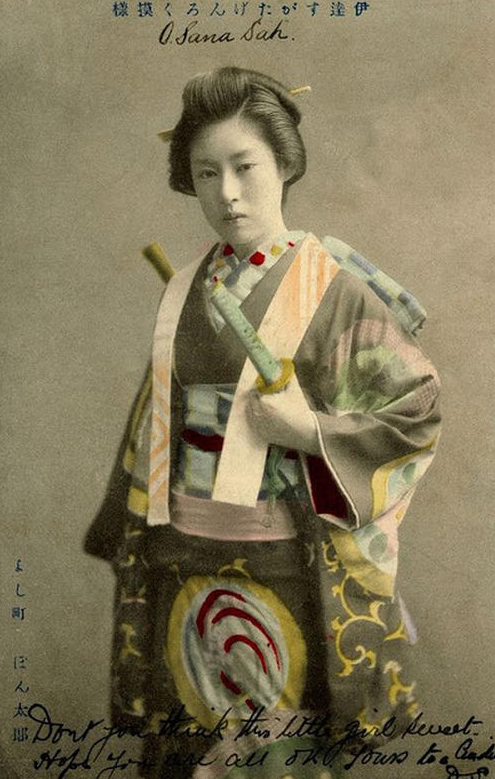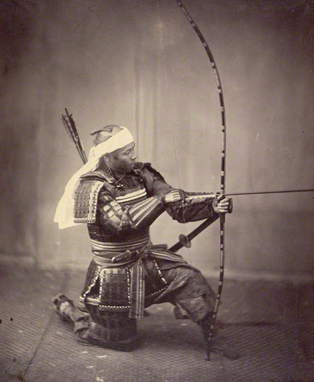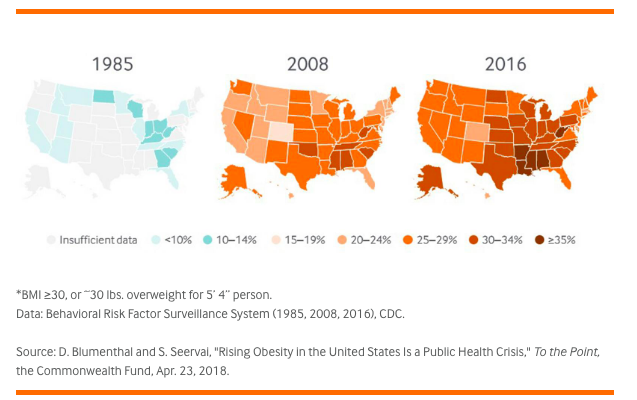Bushido is translated to mean the Way of the Warrior. The Eight Virtues of Bushido are the core values of the Samurai that were essential to the warriors way of being and action.
The Samurai were an elite class of warriors that lived in Japan from about 900 to the 1800’s. Being a samurai was a noble and coveted position in society. The Samurai, or bushi, were trained in the arts of warriorship, including physical and mental strategy and were fiercely loyal to their Lord. Not only did the Samurai need to be the most effective and well – trained warriors, they had to abide by a code of moral behavior that was as strong, if not more so, than their physical skills.

There were also female warriors called Onna-bugeisha “female martial artist”. These women engaged in battle, commonly alongside the samurai men. They were members of the samurai class in feudal Japan and were trained in the use of weapons to protect their household, family, and honor in times of war.
That code of behavior is called Bushido or the Way of the Warrior. There are 8 Virtues of Bushido and has a similar structure and tone to
The Ten Commandments from the Bible, the Ten Commandments of Chivalry, the Nine Noble Virtues for the Vikings and the 7 Core Values of the US Army.
The Eight virtues of Bushido define the road map for making a great human being. I will list the eight virtues and give my perspective on how these virtues are severely lacking in our culture today.
- Justice or Rectitude
- Courage
- Benevolence
- Respect
- Honesty
- Honor
- Duty & Loyalty
- Self – Control
#1: Justice or Rectitude:

Considered the most important virtue of all the virtues, Rectitude means having a good overall moral character. Without this trait, the others could not exist. It is the core of all Samurai and Onna – bugeishi because warriors make a full commitment to their decisions.
“Rectitude is one’s power to decide upon a course of conduct in accordance with reason without wavering, to die when to die is right and to strike when to strike is right”.
“Rectitude is the bone that gives firmness and stature. Without bones the head cannot rest on top of the spine, nor hands move nor feet stand”.
In today’s society we are having a Prison Crisis. The US Bureau of Justice states:
- Over 2 million people or 1% of the American population is incarcerated.
- There has been a 500 percent increase in the number of inmates over the last 40 years.
- The United States has 25 percent of the world’s prison population.
- Local spending on prison is 3 x as much as spending on education.
- 80 billion spent annually on prison.
These figures do not include the mental incarceration of living lives that do not fuel the soul or being locked into a way of thinking about yourself that is not beneficial such as low self – esteem and weak self – worth.
Could this issue be curbed by people adopting early a strong code of justice within themselves?
#2 Heroic Courage:

“Hiding like a turtle in a shell is not living at all. A true warrior must have heroic courage. It is absolutely risky. It is living life completely, fully and wonderfully. Heroic courage is not blind. It is intelligent and strong.”
Having the courage to get up every day and face the challenges presented to us takes courage. You can live in a first world country, have all your physical needs met and still need heroic courage to navigate the day to day struggles of life.
Now more than ever, one needs courage to stand up for what you believe in – to challenge the status quo. The courage to know thyself and to be yourself, to think differently and to trust that suffering is an essential part of developing and growing stronger.
This is where the spiritual or mental or physical practice comes in – adopting a practice helps anchor the day and set goals for improving oneself.
The sad reality is that suicide rates are increasing exponentially.
The NIH reports on suicide are that nearly 47,000 people died from taking their own lives in 2017. Males have a higher rate than females.
Among people ages 15 – 34 suicide is the second leading cause of death. I shudder to think what the numbers will be for 2020…
#3 Benevolence: Love for the good of the whole.

Be individual and love thy neighbor. “the bees surrender themselves entirely to Venus, unfolding a life of love throughout the whole hive. This life will be filled with wisdom; you can well imagine how wise it must be!” ~Rudolph Steiner
The pharmaceutical companies are not taking a benevolent approach to healing. Did you know that one family owns Purdue Pharma, who make OxyContin. The Sackler family earns 3 billion annually from the sale of OxyContin!
Forbes ranked the Sackler family, the sole owner of OxyContin, one of the richest families in the United Sates, having earned $35 billion from the sale of OxyContin since 1999.
When OxyContin hit the market in the 1990’s it was misrepresented as an opiod that was less habit forming than other opiods. It was considered a “product to start with and to stick with”. This article in the New Yorker entitled “The Family that Built an Empire of Pain” details the Sackler’s Family involvement in the opiod crisis.
Opiod abuse & overdose statistics according to the NIH.
- 115 people die daily from opiod abuse
- 80% of the people who start using heroin do so after opiod abuse.
- nearly 200,000 people have died from opiod overdoses from 1999 – 2014.
Question: Why isn’t this being talked about on the news?
#4. Respect. The ancients knew that respecting the Earth was critical for longevity of our species. Today people are thinking short term and have lost the thread.
Respecting the Earth

Half of the 300 million tons of plastic produced each year is used only once.
Plastic Oceans: More than 40 percent of plastic is used to create packaging, including the hundreds of billions of plastic bags used around the globe. Each minute, one million of them are used, and the typical bag is used for 15 minutes before being discarded.
Of the material in the collection of garbage in the Pacific Ocean, 80 percent comes from the land (coastal deposits of plastic from North America take six years to reach the patch), and 20 percent comes from oil rigs, boaters, and cargo ships – most of this is fishing nets. Shipping containers lost at sea dump plastic items such as parts of computer monitors, and even LEGOs, directly into the water.
#5. Honesty:
There is so much untruth out there. Listen to your instinct, observe your reality & draw your own conclusions. Following unthruths and taking information into your heart from the news can having detrimental effects. Know your Truth.
#6. Honor:
According to economist, author & politician, Nitobe Inazo, “The sense of Honor, a vivid consciousness of personal dignity & worth, characterized the samurai. He was born and bred to value the duties and privileges of his profession.”
How many people you encounter who exhibit great honor? This needs to be restored.
#7. Duty & Loyalty:
Have a purpose & serve that purpose.
The US Army defines duty as one of it’s core values:
“Fulfill your obligations.
The essence of duty is acting in the absence of orders or direction from others, based
on an inner sense of what is morally and professionally right….
Duty begins with everything required of you by law, regulation, and orders; but it
includes much more than that. As a professionals do your work not just to the minimum standard, but to the very best of your ability. Commit to excellence in all aspects of your professional responsibility so that when the job is done they can look back and say, “I couldn’t have given any more.”
Take the initiative, figuring out what needs to be done before being told what to do.
What’s more, take full responsibility for your actions and those of your subordinates.
Never shade the truth to make the unit look good—or even to make others feel good.
Instead, follow your higher duty to the Army and the nation. “
#8: Self – Control
One place to look at for a lack of self – control is the obesity epidemic in the USA. The latest estimates are that approximately 34% of adults and 15–20% of children and adolescents in the U.S. are obese. Obesity affects every segment of the U.S. population.

Good questions to ask yourself are:
What are the Tenets that you live by?
Which virtues do you excel at?
Do any of the virtues seem to be lacking in your life?
Thank you for reading. Please leave a comment, I’d love to hear your thoughts!






